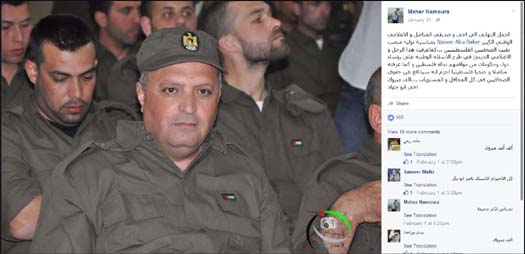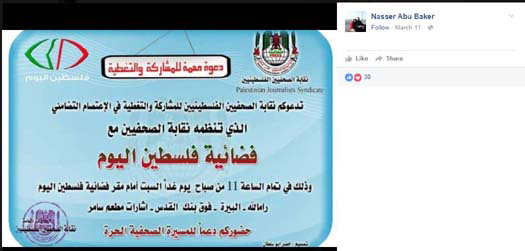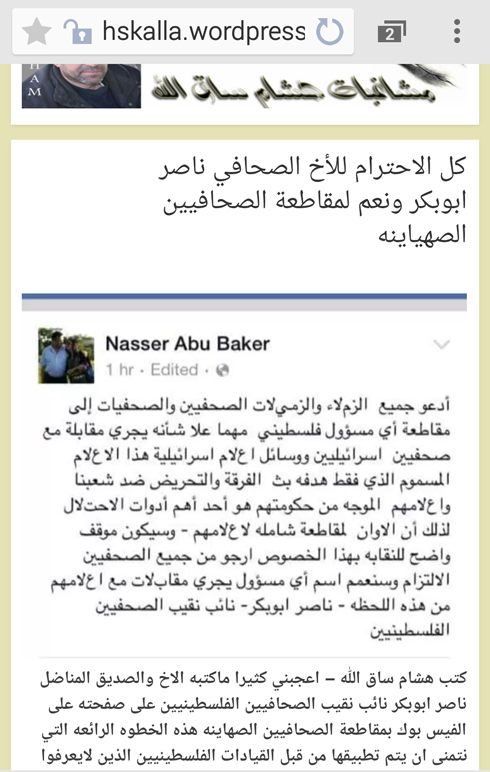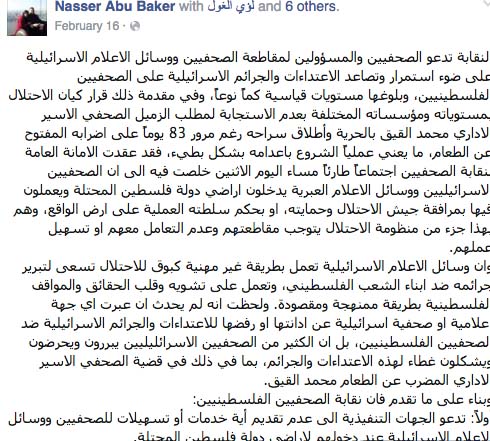May 24, 2016 — “Objectivity is a difficult goal to achieve. The mere unavoidable organisation of facts can influence a reader’s judgement. However, this does not prevent us from pursuing our policy of rigorous neutrality. According to its remit, AFP is independent of the French government and all other economic or political interests.” So state the lofty principles enshrined in “Agence France Presse’s Values.”
How, then, does one explain the fact that Nasser Abu Baker, the chairman of the Palestinian Journalists’ Syndicate, the leading force for the boycott of Israeli journalists and media, also writes for the influential French news agency?

Nasser Abu Baker, wearing a Palestinian Authority military uniform (Source Facebook, Jan. 31, 2016)
In January 2016, the board of the Palestinian Journalists’ Syndicate appointed Nasser Abu Baker, also spelled Abu Bakr, chairman. Previously, he held the title of deputy chairman of the organization for many years. During this period, and dating back for more than a decade, Abu Baker has also worked as a reporter for AFP covering Israeli-Palestinian affairs. Two Israeli journalists who cover the Palestinians confirmed to CAMERA that Abu Baker continues to work for the news agency. One of those reporters checked his information with three Palestinian journalists, who also confirmed that Abu Baker still reports for AFP while he serves as a senior official at the PJS. Abu Baker’s Facebook account also indicates that he works for AFP.
The conflict of interests is clear. For example, in June 2015, AFP published an article falsely alleging that “[s]ome 17 journalists were killed covering the July-August [2014] Gaza war.” As CAMERA noted at the time, the AFP did not attribute the claim to any source. A report by the Meir Amit Intelligence and Terrorism Information Center stated:
About a week after the end of Operation Protective Edge the Palestinian Journalists Syndicate issued a list of 17 names, allegedly of journalists who had been killed in [the summer 2014 Gaza] operation. The list was published by the PA’s Wafa News Agency, which received it from the Hamas-controlled Gaza office of the ministry of information.
About the Palestinian Journalists Syndicate, the ITIC explained:
The Palestinian Journalists Syndicate is a trade union established in 1979, originally located in Jerusalem. Today its main offices are in Ramallah and it has a branch in the Gaza Strip controlled, in ITIC assessment, by Hamas. Its chairman is Abd al-Nasser al-Najar, who has two deputies, Nasser Abu Bakr in Judea and Samaria and Tahsin al-Astal in the Gaza Strip (Website of the Palestinian Journalists Syndicate, February 4, 2015).
As the ITIC detailed, and as CAMERA communicated to AFP editors, eight of the 17 on the Hamas/PJS list were Hamas and Palestinian Islamic Jihad terror operatives or worked for Hamas or Islamic Jihad media outfits. Based on that information, AFP commendably revised the story. The amended article noted that the disputed claim originated with the Hamas-run ministry of information, but still left out the involvement of the Palestinian Journalists’ Syndicate.
The episode underscores a fundamental problem. The AFP, where Abu Baker was clearly working at the time, published an unsigned article containing false information which originated with the PJS, where Abu Baker also worked. Not only did AFP initially fail to identify the source of the misinformation about 17 journalists, it also has never disclosed to its readers that one of its journalists holds a high-level position in the Palestinian Journalists’ Syndicate for years. AFP’s prized “rigorous neutrality” was clearly compromised.
In another instance of conflicting interests, early this month, AFP reported on the arrest of Omar Nazzal, “a member of the general secretariat of the Palestinian Journalists Syndicate,” who, according to the Shin Bet security service was detained due to his “involvement in terror group activities” (“Israel detains Palestinian journalist without trial,” May 2).
The article states that Israel’s Shin Bet security service “said the journalist, 54, was recently appointed to a top position at Falestine al-Youm which Israel’s army forcibly closed in Ramallah on accusations of incitement to violence.”
The article neglects to note that Falestine al-Youm, or Palestine Today, is affiliated with Islamic Jihad, a terrorist organization according to the EU and the US.
The article also omits to note that the Shin Bet said that Nazzal took part in “unlawful activity” for the Popular Front for the Liberation of Palestine, also a terrorist organization according to the EU and the US. (Blogger Elder of Ziyon points out that Nazzal’s articles appear on the PFLP site.) No byline accompanies the article. There is no way to know what role, if any, AFP’s Nasser Abu Baker played in an article about the arrest of his PJS colleague for terror-related activities.
Similarly, last March, AFP covered Israeli raids of the Ramallah offices of Palestine Today, the Islamic-Jihad affiliated television station. While AFP was covering the raid of the Islamic Jihad outlet, Abu Baker’s PJS was condemning it. By what means could AFP possibly ensure rigorous neutrality in this case? Even if AFP officials did have a feasible system in place to do so, the appearance of neutrality has inevitably been compromised.

Abu Baker’s March 11 Facebook post of the PSJ flier calling for a sit-in in solidarity with Palestine Today
The same question applies to AFP’s coverage of Mohammed al-Qiq, a Palestinian journalist held by Israel for months without trial. According to Israel’s Shin Best domestic security service, he is affiliated with Hamas and was held due to his ongoing involvement in terror activity.
While AFP was covering al-Qiq, the Palestinian Journalists’ Syndicate, headed by Abu Baker, was campaigning for his immediate release.
Indeed, Abu Baker’s dual affiliation presents a significant quandary for the AFP. How can the news agency maintain neutrality when the PJS is a protagonist in the story? While the PJS was involved with the al-Qiq, the Palestine Today and the “17 killed journalists” stories, AFP’s coverage never mentioned the Palestinian journalists’ group. According to Lexis-Nexis searches, the last time the news agency mentioned the journalists’ union was in 2009. Simply ignoring a player’s role in the story does not “present an account of events free of any form of distortion,” as called for by AFP values. Moreover, AFP values proclaim:
Our duty is to present the positions of all parties involved, favouring none. In cases where this is not immediately possible, our efforts to contact all of the protagonists are reported within the story, efforts which are then repeated at the first available opportunity. (Emphasis in the original.)
PSJ Boycott of Israeli Journalists
In addition, in a separate case, AFP has completely ignored an important story in which PJS played a role. The PJS has been the driving force behind the Palestinian boycott of Israeli journalists, a campaign which has compromised the safety of Israeli journalists working in Palestinian controlled territories. Palestinians48.Net, an Israeli-Arab site, quoted a PJS statement and reported that PJS called on its members and Palestinian officials to boycott Israeli media “in light of the continued and escalating Israeli assaults on Palestinian journalists.” The syndicate said in a statement that “Israeli journalists and Hebrew media outlets enter the lands of the State of Palestine and work there together with – and under the protection – of the Israeli occupation army.” The syndicate also called on “all Palestinian officials not to deal or give interviews or statements to Israeli reporters, pointing out that it will follow up on the implementation of this decision, including taking positions against those who violate.”
According to an Israeli journalist who frequently reports from the Palestinian areas, Abu Baker “is without a doubt among the leaders in the boycott movement against Israeli journalists.” The Israeli, who refused to be named because of his ongoing work in Palestinian-controlled territory, maintained that Abu Baker “carries out a witch hunt against Palestinian journalists who don’t abide by this policy” by harassing and smearing them.
Indeed, when he was deputy chairman of the syndicate, Abu Baker recently threatened:
I call upon all male and female colleagues/journalists to boycott any Palestinian official, regardless of how senior he/she is, who conducts an interview with Israeli journalists and Israeli media…this poisonous media whose only goal is to broadcast dissent and incite against our people. Their media, which is directed by their government, is one of the tools of the occupation. Therefore, the time has come for a comprehensive boycott of their media. The Syndicate will have a clear position on this and I plead with all the journalists to abide. We will publish the name of any official who gives an interview to their media from this moment.

A similar statement announcing the boycott, posted on Abu Baker’s Facebook page and signed by the PJS ‘general secretariat,’ appears in the image below.

The boycott campaign against Israeli journalists has endangered their safety, and many have simply stopped reporting from Palestinian areas, the veteran Israeli journalist said. For many years, Israeli journalists moved freely through Palestinian areas, secure in the knowledge that they enjoyed protection from their Palestinian colleagues, he said.
That is no longer the case, he lamented. He now avoids demonstrations and crowds, fearing that the Palestinian journalists upon whom he once relied for protection would be the first to call in forces to expel him, or worse. He described his work visit to Bethlehem last Christmas, in which he repeatedly evaded Palestinian journalists who might recognize him. Before the boycott, “if something bad were to happen, we would have someone to count on,” he noted.
How does the AFP’s relationship with Abu Baker, a driving force behind the campaign which impedes the work of Israeli journalists and even endangers them, serve “truth, impartiality and plurality,” AFP’s self-proclaimed “golden rules”?
Rigorously Checked Facts?
So why does AFP continue to employ Abu Baker? Certainly, it’s not on account of his “rigorously checked facts,” a key value at the news agency. On March 24, Abu Baker attended a conference in Jordan where he made the completely unfounded allegation that Israeli hospitals are treating 5000 ISIS members.
In addition, according to a March 29 article in Al Watan, a Gaza-based independent news website,
Abu Baker said in an interview with Mawteny radio that he attended the conference of Media and Terrorism (in Jordan) in order to expose the crimes and practices of the Israeli occupation. He said, “We asked Arab media people to intensify their effort to expose the Nazi and racist crimes of the Israeli occupation against the Palestinian people and to bring back the Palestinian cause to the center of the Arab media’s attention.” He said that the Israeli occupation has implemented its DAESH (ISIS) practices against the Palestinians by destroying Palestinian villages, daily executions, arrests and the targeting of children and journalists in the field. He held the Netanyahu government responsible for legitimizing these practices against the Palestinian people.”
Does AFP believe that a journalist who freely dispenses accusations of Israeli Nazi-like crimes and ISIS practices shares the agency’s core value of “accurate, truthful news”?
Perhaps AFP officials fear were they to discontinue working with Abu Baker, the agency’s access in Ramallah and the rest of the Palestinian Authority-controlled West Bank would be jeopardized. After all, once the PJS decided to boycott Israeli journalists, it became very difficult for them to continue working in Palestinian controlled areas, and many simply stopped. Is AFP fearful of the same fate as their Israeli colleagues?
As of this writing, AFP officials had not responded to CAMERA request for comment.
Dec. 4, 2016 Update: AFP’s Nasser Abu Baker Runs For Fatah Revolutionary Council
AFP’s Nasser Abu Baker is one of 1,400 delegates attending the Seventh Fatah Congress, which wraps up today. Moreover, he is running for the Fatah Revolutionary Council. As a Palestinian news site reported:
Nasser Abu Baker, Chairman of the Palestinian Journalists Syndicate and the Representative of Palestine at the International Journalists Union, announced on Monday his intention to present his candidacy to the election for the Fatah Revolutionary Council during the Seventh Fatah Congress that is being held in Ramallah. Abu Baker said he views the convening and the success of the Fatah Congress as an historic revival for Fatah and a renewal of its leadership and struggling spirit. He said that Congress’s positive effects will affect Fatah and the arousal of the Palestinian cause.
Abu Baker clarified that his intention to present his candidacy and become a member of the Revolutionary Council stems from his keenness to upgrade the Fatah media and the significance of representation of journalists in the leadership of Fatah.
“My decision to run in the election for the Revolutionary Council stems from my and my colleagues’ desire to awaken the Fatah media, which needs to be awakened so that it would be devoted primarily in favor of the national interest and redirect the compass toward our cause toward Jerusalem and the (right of) return.”
At 10 a.m. EST today, when official election results are available, it will become known whether congratulations are due to the AFP for owning the dubious distinction of being the first Western media outlet with representation on the Fatah Revolutionary Council. At what point, if at all, does AFP draw a red line, determining that its stated commitment to maintain independence from “economic or political interests” is actually a guiding principle, and not just a declarative statement?
3:00 p.m. EST — According to final lists, AFP’s Abu Baker did not win a seat on the Fatah Revolutionary Council.
To read this report in Spanish, visit CAMERA’s Revista De Medio Oriente.
